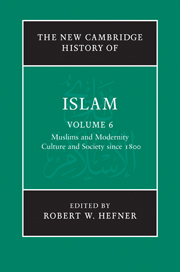Book contents
- Frontmatter
- 1 Introduction: Muslims and modernity: culture and society in an age of contest and plurality
- PART I SOCIAL TRANSFORMATIONS
- PART II RELIGION AND LAW
- PART III POLITICAL AND ECONOMIC THOUGHT
- PART IV CULTURES, ARTS AND LEARNING
- 20 Islamic knowledge and education in the modern age
- 21 History, heritage and modernity: cities in the Muslim world between destruction and reconstruction
- 22 Islamic philosophy and science
- 23 The press and publishing
- 24 The modern art of the Middle East
- 25 Cinema and television in the Arab world
- 26 Electronic media and new Muslim publics
- Glossary
- Bibliography
- Index
- References
26 - Electronic media and new Muslim publics
from PART IV - CULTURES, ARTS AND LEARNING
Published online by Cambridge University Press: 28 March 2011
- Frontmatter
- 1 Introduction: Muslims and modernity: culture and society in an age of contest and plurality
- PART I SOCIAL TRANSFORMATIONS
- PART II RELIGION AND LAW
- PART III POLITICAL AND ECONOMIC THOUGHT
- PART IV CULTURES, ARTS AND LEARNING
- 20 Islamic knowledge and education in the modern age
- 21 History, heritage and modernity: cities in the Muslim world between destruction and reconstruction
- 22 Islamic philosophy and science
- 23 The press and publishing
- 24 The modern art of the Middle East
- 25 Cinema and television in the Arab world
- 26 Electronic media and new Muslim publics
- Glossary
- Bibliography
- Index
- References
Summary
Islam’s publics and public sphere have expanded and been significantly transformed in the modern period, taking on new ‘forms of life’ through media that are defining features of modernity and its global transformations. The printing of religious texts, which became commonplace in the nineteenth century, put them into mass circulation and contributed to a renewed textualism as both repository and symbol of fixity, complementing oral transmission and thereby associating the latter’s adepts with ‘traditionalism’. Key texts of religion, which may previously have existed only in scattered manuscript copies, not only became broadly accessible via print, by definition mass circulation; print reinforced the symbolic register of Islam as a ‘religion of the book’ in broader mass publics. Broadcasting exposed mass audiences to particular forms of piety and their purveyors, including not least the states that monopolised broadcasting from the 1930s until satellite television in the 1990s. The advent of the internet by the latter decade brought something like the full global diversity of Islam from grassroots expression to programmatic responses into view and just a click away for new, global publics. The new publics included diasporas and religious seekers, Muslims and non-Muslims, and believers in non-Muslim-majority countries as well as in long-standing Muslim societies. Already by this period, sermons and other religious discourse circulated via cassette tapes in nearly every Muslim society.
- Type
- Chapter
- Information
- The New Cambridge History of Islam , pp. 648 - 660Publisher: Cambridge University PressPrint publication year: 2010



